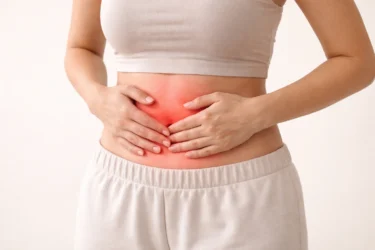How To Know If You’re Pregnant?
By Dr. Charmi Shah +2 more

Get,

to manage your symptom
Get your,


4 Cr+ families
benefitted

OTP sent to 9988776655



You’ve successfully subscribed to receive
doctor-approved tips on
Whatsapp

Get ready to feel your best.

Hi There,
Download the PharmEasy App now!!


Register to Avail the Offer
Send OTPBy continuing, you agree with our Privacy Policy and Terms and Conditions

Hi There,
Sign up on PharmEasy now!!
Trusted by 4 crore+ families

OTP sent to 9988776655



You have unlocked 25% off on medicines




Code: NU25
By Dr. Charmi Shah +2 more
Table of Contents
Each woman’s experience with pregnancy is unique. Some women may have a feeling they’re pregnant as early as the first few weeks of their pregnancy, while others may not realise they are pregnant until they miss their period. Let us understand some of the early signs that may indicate a pregnancy before a missed period.


Extreme weariness or exhaustion is one of the most common early signs of pregnancy. Even if you have had 7-9 hours of sleep, activities that have never affected you before may exhaust you. During pregnancy, the body’s increased metabolic demand might cause fatigue and increase your nutritional needs. The fatigue may also be caused by increasing progesterone levels and changes in blood volume1. This symptom may normally last during the first trimester and may be managed with dietary changes and supplements. However, if the fatigue is severe, it is recommended to get a complete blood count to rule out anaemia and thyroid profile.

You may notice an increased need to urinate1, not associated with a foul smell or burning sensation, even before you miss a period. If you experience a burning sensation or a foul smell with urination2, you should get a urine routine and culture done to rule out a urinary tract infection.

In the first few weeks after conception, you may also notice an increased cravings for certain foods. Some women also experience a sudden and increased sensitivity to smells and intense flavours along with food aversions that may or may not persist throughout the pregnancy. If you have severe food aversion with vomiting more than three times a day and weight loss, you may have hyperemesis gravidarum (severe and persistent nausea and vomiting during pregnancy)3. For a balanced nutritional intake, you should consult a dietician or your gynaecologist.

A week before the missed period, you may notice sore, painful, heavy breasts or darkened areolas. The breasts may become sore and painful due to increased oestrogen and progesterone levels after conception4. This symptom may also occur in the luteal phase of the menstrual cycle or if you have fibrocystic breast disease, in which case the tenderness may be localised or associated with lumps in the breast tissue.

Usually, your temperature rises before ovulation and returns to normal following the menstrual cycle. However, if the basal body temperature remains elevated for a longer time, it may be an early sign of pregnancy5.

Lightheadedness or dizziness is an early sign of pregnancy that affects many pregnant women. The discomfort may last for the first trimester and then gradually fade. However, dizziness may also be caused by anaemia or low blood pressure3. So you should get early pregnancy laboratory tests like complete blood count, monitor your blood pressure, and increase hydration to rule out other causes of dizziness.

An increase in vaginal discharge, along with a thicker consistency of the discharge, can be an early sign of pregnancy. However, if you experience a stinging sensation, itching, or soreness around the vaginal area along with discharge, you may have a vaginal infection, for which you should get checked by a doctor6. Also, a thick discharge is not always pregnancy-related, it could also be due to infection or hormonal changes.
Always, a pregnancy should be confirmed by a urine test and ultrasound abdomen by your obstetrician.
Dr. M.G. Kartheeka, MBBS, MD(Pediatrics)

Cramping is a common early pregnancy symptom and is often mistaken for premenstrual cramps or period-related discomfort. In early pregnancy, this cramping is usually mild and caused by increased blood flow to the uterus or implantation. However, it’s important to distinguish implantation cramping from signs of more serious conditions, such as a threatened abortion or ectopic pregnancy7. Cramping that is severe, localised to one side, or accompanied by vaginal bleeding can be considered a warning sign and needs immediate medical attention.

A week or so before your period is due, you may experience some discomfort and a slight vaginal discharge of light pink or brownish blood. This is called implantation bleeding or spotting, which occurs as the fertilised egg attaches to the uterine lining. Spotting may sometimes be mistaken for a period. Spotting may also be experienced in ectopic pregnancies or early miscarriage. Therefore, if spotting is accompanied by pain, dizziness, or heavy bleeding, you should get an ultrasound done8.
Also Read: Myths and Facts About Pregnancy

Bloating or stomach cramps are one of the most common pregnancy symptoms before a missed period. Progesterone, which increases in the initial stages of pregnancy, can slow down the movement of the gastrointestinal tract, causing bloating. Bloating can also occur with premenstrual syndrome (PMS), but unlike PMS-related bloating, which usually subsides once the period begins, pregnancy-related bloating may persist9.
Certain abdominal or ovarian cysts can sometimes cause symptoms or physical findings, like abdominal bloating or a palpable mass that may be mistaken for early pregnancy or, less commonly, a twin pregnancy. A detailed medical history and a thorough scanning technique are essential to diagnose or rule out pregnancy.
Dr. Ashish Bajaj, M.B.B.S., M.D., in Clinical Pharmacology and Toxicology
A home urine pregnancy test might be able to tell you if you are pregnant, but it’s not always 100% reliable10. To confirm the pregnancy and make sure it is not an ectopic pregnancy (pregnancy growing in the fallopian tubes), doctors often recommend an internal ultrasound at around 6 to 7 weeks. In some cases, like if the test result is unclear or if an ectopic pregnancy is suspected, a blood test called beta-hCG can give more accurate information.
You should see a doctor if you have light bleeding with pain, feel very dizzy or faint, or have ongoing vomiting. It’s also important to get checked if you have a positive pregnancy test with lower tummy pain, or if you notice burning, itching, or unusual discharge from your vagina. These signs may need early medical care to keep you safe and healthy.
Also Read: How to Increase Female Libido Safely and Effectively
Many early pregnancy symptoms are similar to premenstrual syndrome or other health conditions, making it difficult to rely on symptoms alone. While these signs may give you clues, they are not diagnostic by themselves. The most reliable way to confirm a pregnancy is by taking a pregnancy test, especially if you’ve missed your period and suspect you might be pregnant. Always consult your gynaecologist for confirmation and further guidance, as early prenatal care plays a vital role in ensuring a healthier pregnancy journey for both mother and baby.
Also Read: Early Signs of Implantation: What to Expect Before You Miss Your Period
Disclaimer: The information provided here is for educational/awareness purposes only and is not intended to be a substitute for medical treatment by a healthcare professional and should not be relied upon to diagnose or treat any medical condition. The reader should consult a registered medical practitioner to determine the appropriateness of the information and before consuming any medication. PharmEasy does not provide any guarantee or warranty (express or implied) regarding the accuracy, adequacy, completeness, legality, reliability or usefulness of the information; and disclaims any liability arising thereof.
Comments

Leave your comment...
You may also like
Comments